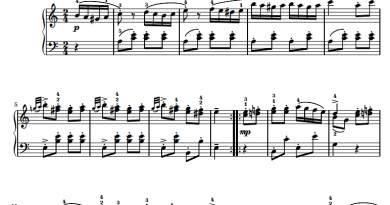Playing piano from memory and in company
Now that the pupil has made some progress, he should also endeavor to learn to play from memory. Endeavor to commit only that which you have thoroughly mastered, and learn one part at a time. Do not allow yourself any liberties by way of changing a composition; always be honest and faithful to the composer.
Refresh your memory from time to time, by reading over again the composition that you have committed. Frequent use of our faculties brightens them, so if you find it difficult to commit a piece to memory, be not discouraged. Continue with your attempts and you will eventually succeed. Begin with little and easier pieces.

Playing piano in company : tips
- It is, as a rule, not advisable for young pupils to play much in company. Still all should be prepared to play something when asked to do so. This is a source of pleasure to the player as well as to the hearer. Observe the following rules:
Never play anything m company that is not worth playing. - Never play anything with which you are not thoroughly familiar. Do not expose yourself unnecessarily to criticism.
- Keep calm when playing in company. Play slow, rather too slow than too fast.
- Do not stop to correct errors, but play right through the piece as if no mistake had been made.
- Blame yourself, and yourself only when failing in playing anything in public that you have not thoroughly mastered.
The public leaves the choice of piece to you, so choose wisely. - Bear in mind that any piece of music becomes more difficult when playing it before others, simply because we are apt to become nervous; therefore select from your easier pieces.
- Play only when your fingers are warm, and when the instrument is in a proper condition to be used. It is more impolite to ask a person to play in company on an untuned piano, than it is to refuse to do so.
- Bear in mind that there is a difference of touch in pianos. Be prepared for this when playing in company.
- The plainest piece well played pleases more than a difficult one poorly played. The audience will always be more ready to give you credit for a perfect artistic performance of an easy piece, than for an imperfect rendition of a difficult one. When asked to prepare something for an entertainment select from among your older pieces. It is a mistaken idea that only the new will rebase or be to your credit.
- Pay no attention to criticism, do your best and there let your performance rest. Do not stop to fish for compliments, nor undervalue praise honestly bestowed upon you.
- Do not indulge in severe criticism towards those who play before or after you. Be sure your words will reach the ears of others, cause pain, and produce ill feelings.
- Watch your personal appearance when playing in public. Avoid all distortions of face, all unnecessary motions of body, in short, everything that is unnatural or ostentatious.
Duet playing for piano players
The teacher should select from time to time duets for the pupil’s use, sometimes allowing him to play the treble, t other times obliging him to play the bass. By this practice, the pupil will gain in the art of smooth and even playing, and for this reason it is of especial importance to those who stammer while playing or who find it difficult to keep correct time.
Playing ugly parts on piano
Every piece has some part that is more difficult than others. Owing to the fact that pupils usually play such difficult parts in a deficient manner, they designate them as “ugly.” Were they to overcome all the technical difficulties such parts present, they would not find them ugly. Let pupils pay especial attention to these difficult and so-called “ugly” parts.



